De Duitse dichter en schrijver Ror Wolf (pseudoniem van Raoul Tranchirer) werd geboren op 29 juni 1932 in Saalfeld/Saale. Zie ook mijn blog van 29 juni 2007 en ook mijn blog van 29 juni 2008 en ook mijn blog van 29 juni 2009 en ook mijn blog van 29 juni 2010.
Uit: Zwei oder drei Jahre später
Vorgänge im Gebirge
Ein Mann, ein Geiger, ein unbekannter Geiger, dessen Name mir beim besten Willen nicht einfallen will, sagte, als man ihn in einem Wirtshaus in Gletsch bat, ein wenig zu geigen, daß er seine Geige vergessen oder vielmehr verloren habe. Er glaube, er habe sie in Lax verloren, auf seinem Weg ins Gebirge, auf dem der Schnee derart dick den Boden bedeckte, daß er gar nicht gespürt habe, wie sie hinabgefallen sei, sie sei ohne Geräusche hinabgefallen, er habe dieses Hinabfallen gar nicht bemerkt. Er sei an diesem Abend noch in ein Wirtshaus gegangen, wo man ihn aufgefordert habe, ein wenig zu geigen, und habe erst in diesem Moment entdeckt, daß er gar keine Geige mehr hatte. Vor allem deshalb sei er ein unbekannter Geiger geblieben, und zwar sein Leben lang.
Wetterverhältnisse
Es schneit, dann fällt der Regen nieder,
Dann schneit es, regnet es und schneit,
Dann regnet es die ganze Zeit,
Es regnet und dann schneit es wieder.
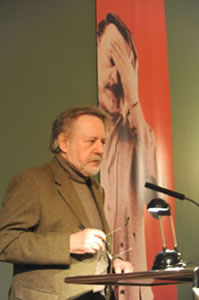
Ror Wolf (Saalfeld/Saale, 29 juni 1932)
De Servische dichter Vasko Popa werd geboren in Grebenac op 29 juni 1922. Zie ook mijn blog van 29 juni 2007 en ook mijn blog van 29 juni 2008 en ook mijn blog van 29 juni 2009 en ook mijn blog van 29 juni 2010.
A Forgetful Number
Once upon a time there was a number
Pure and round like the sun
But alone very much alone
It began to reckon with itself
It divided multiplied itself
It subtracted added itself
And remained always alone
It stopped reckoning with itself
And shut itself up in its round
And sunny purity
Outside were left the fiery
Traces of its reckoning
They began to chase each other through the dark
To divide when they should have multiplied themselves
To subtract when they should have added themselves
That’s what happens in the dark
And there was no one to ask it
To stop the traces
And to rub them out.
Far Within Us 2
Look here’s that uninvited
Alien presence look it’s here
A shudder on the ocean of tea in the cup
Rust taking hold
On the edges of our laughter
A snake coiled in the depths of the mirror
Will I be able to hide you
From your face in mine
Look it’s the third shadow
On our imagined walk
Unexpected abyss
Between our words
Hoofs clattering
Below the vaults of our palates
Will I be able
On this unrest-field
To raise you a tent of my hands
Give Me Back My Rags
Just come to my mind
My thoughts will scratch out your face
Just come into my sight
My eyes will start snarling at you
Just open your mouth
My silence will smash your jaws
Just remind me of you
My remembering will paw up the ground under your feet
That’s what it’s come to between us
Vertaald door Anne Pennington
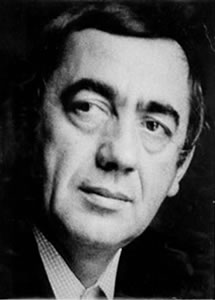
Vasko Popa (29 juni 1922 – 5 januari 1991)
De Italiaanse journaliste en schrijfster Oriana Fallaci werd geboren in Florence op 29 juni 1929. Zie ook mijn blog van 29 juni 2007 en ook mijn blog van 29 juni 2008 en ook mijn blog van 29 juni 2009 en ook mijn blog van 29 juni 2010.
Uit: Inshallah
“Maybe he couldn’t bear the dejection of having proved a fact that even newborns divine, the invincibility of death, and out of consistency he surrendered to it before his time. Or maybe he concluded that, besides constituting the inevitable goal of every thing and every creature, Death is a relief: a repose. And out of impatience, or out of exhaustion, he ran up to it. Could I imitate him? Well, though I can’t deny that sometimes Death offers repose or relief, though what we think and desire today doesn’t usually correspond to what we’ll think or desire tomorrow because every tomorrow is a trap of ugly surprises, my answer is no. I don’t think I could run up to Death for impatience or exhaustion. Unless… No, no… I’ll never yield, I’ll never bend, to its invincibility. I’m too certain that Life is the measure of all, the mainspring of all, the goal of all. And I hate Death too much. I hate it as much as I hate solitude, suffering, pain and the word goodbye..”
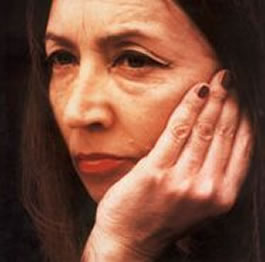
Oriana Fallaci (29 juni 1929 – 15 september 2006)
De Italiaanse dichter en schrijver Giacomo Leopardi werd geboren in Recanati op 29 juni 1798. Zie ook mijn blog van 29 juni 2007 en ook mijn blog van 29 juni 2008 en ook mijn blog van 29 juni 2009 en ook mijn blog van 29 juni 2010.
The Village Saturday Night
The damsel from the field returns,
The sun is sinking in the west;
Her bundle on her head she sets,
And in her hand she bears
A bunch of roses and of violets.
To-morrow is a holiday,
And she, as usual, must them wear
Upon her bodice, in her hair.
The old crone sits among her mates,
Upon the stairs, and spins;
And, looking at the fading light,
Of good old-fashioned times she prates,
When she, too, dressed for holidays,
And with light heart, and limb as light,
Would dance at night
With the companions of her merry days.
The twilight shades around us close,
The sky to deepest blue is turned;
From hills and roofs the shadows fall,
And the new moon her face of silver shows.
And now the cheerful bell
Proclaims the coming festival.
By its familiar voice
How every heart is cheered!
The children all in troops,
Around the little square
Go, leaping here and there,
And make a joyful sound.
Meanwhile the ploughman, whistling, returns
Unto his humble nest,
And thinks with pleasure of his day of rest.
Then, when all other lights are out,
And all is silent round,
The hammer’s stroke we hear,
We hear the saw of carpenter,
Who with closed doors his vigil keeps,
Toils o’er his lamp and strives so hard,
His work to finish ere the dawn appear.
The dearest day of all the week
Is this, of hope and joy so full;
To-morrow, sad and dull,
The hours will bring, for each must in his thought
His customary task-work seek.
Thou little, sportive boy,
This blooming age of thine
Is like to-day, so full of joy;
And is the day, indeed,
That must the sabbath of thy life precede.
Enjoy, it, then, my darling child,
Nor speed the flying hours!
I say to thee no more:
Alas, in this sad world of ours,
How far exceeds the holiday,
The day that goes before!
Vertaald door Frederick Townsend
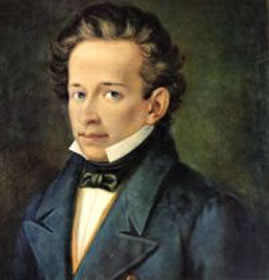
Giacomo Leopardi (29 juni 1798 – 14 juni 1837)
Portret doorA. Ferrazzi, rond 1820
De Franse schrijver Antoine de Saint-Exupéry werd geboren op 29 juni 1900 in Saint-Maurice-de-Rémens. Zie ook mijn blog van 29 juni 2010 en eveneens alle tags voor Antoine de Saint-Exupéry op dit blog.
Uit: Le Petit Prince
“”IL y a six ans, j’avais une panne dans le désert du Sahara. Quelque chose s’était cassé dans mon moteur. et comme je n’avais avec moi ni mécanicien, ni passagers, je me préparai à essayer de réussir , tout seul, une réparation difficile. C’était pour moi une question de vie ou de mort. J’avais à peine de l’eau à boire pour huit jours
Le premier soir je me suis donc endormi sur le sable à mille milles de toutes les terres habitées. J’étais plus isolé qu’un naufragé sur un radeau au milieu de l’océan. Alors vous imaginez ma surprise, au lever du jour, quand une drôle de petite voix m’a réveillé. Elle disait:
– S’il te plaît… dessine-moi un mouton!
J’ai sauté sur mes pieds comme si j’avais été frappé par la foudre. J’ai bien frotté les yeux. J’ai bien regardé. Et j’ai vu un petit bonhomme tout à fait extraordinaire qui me considérait gravement.
Mais mon dessin, bien sûr, est beaucoup moins ravissant que le modèle. Ce n’est pas ma faute. J’avais été découragé dans ma carrière de peintre par les grandes personnes, à l’âge de six ans, et je n’avais rien appris à dessiner, sauf les boas fermés et les boas ouverts”
.
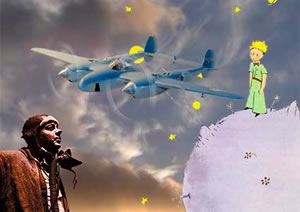
Antoine de Saint-Exupéry (29 juni 1900 – 31 juli 1944)
De Vlaamse schrijver Anton “Tony” Bergmann werd geboren te Lier op 29 juni 1835. Zie ook mijn blog van 29 juni 2007 en ook mijn blog van 29 juni 2009 en ook mijn blog van 29 juni 2010.
Uit: Brigitte
“BIJ DEN WATERVAL.
Giessbach is de vermaardste waterval van Zwitserland.
De Rijnval is grootschar, — de Staubbach hooger, — de Reichenbach woester ; nergens is het
tafereel zoo volledig, zoo harmonisch, zoo verrukkend schoon als bij den Giessbach
Te midden van het lachendste landschap, van frissche weiden en weelderig groen, ontspringt de stroom uit het somber woud, en stort zich met wilde vaart in de diepte neder.
Schuimend en bruisend valt de zilveren straal, van heuvel tot heuvel, van rots tot rots. Een regen van droppels schitteren en vonkelen als perelen en robijnen onder den glans der morgenzon, terwijl duizenden lichtspoken en regenbogen dansen en spelen op het vochtig stof.
’s Avonds is het een ander tooneel. Achter de watervallen worden Bengaalsche vuren geplaatst, en op een gegeven sein verandert de donkere beek in eenen gloeienden lavastroom, die met schrikbarend gedruisch en geraas naar den afgrond helt, dalen en bosschen met brand en verwoesting
bedreigend.
Verbazend schouwspel, dat maar eenen oogwenk duurt, doch waanvan de indruk immer bijblijft
Vriend Haselthine schijnt diep getroffen. “Spl endid, splendid!» roept hij in bewondering uit.
Leunend op zijnen alpenstok, heeft hij plaats genomen op eenen Loogen rotsblok, en zijn oog
volgt droomend de grillige sprongen van den stroom.
Ik zit op een grasheuveltje aan de andere zijde, en beschouw in ernstig gepeins mijnen nieuwen vriend, Benen vriend van acht dagen; doch op reis heet men elkander spoedig vriend.
Een toerist, met wien men eenige woorden wisselt, is eene kennis; drinkt men een glas wijn met
hem, dan wordt hij eene betrekking; na een uitstapje van eenen namiddag, wisselt men visitekaartjes en complimenten; maar na een voetreisje van Benige dagen is men voor het leven bevriend, en scheidt men met warmen handdruk en soms met vochtige ooges.”
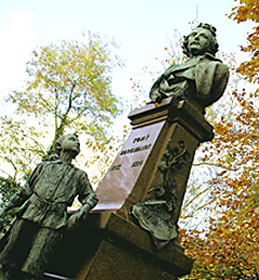
Anton Bergmann (29 juni 1835 – 21 januari 1874)
Standbeeld door Frans Joris in Lier
Zie voor nog meer schrijvers van de 29e juni ook mijn vorige blog van vandaag.
